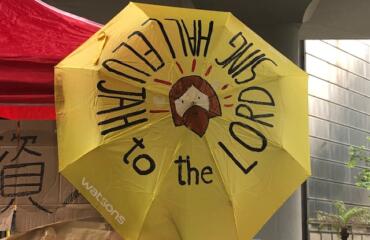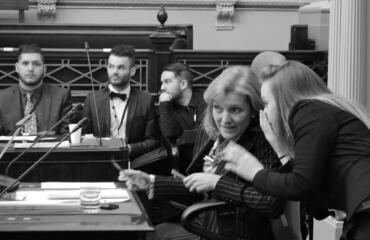Just one hand was raised when the crowd was asked if they believed the Napthine Government would be returned to power on November 29.
But while panelists James Campbell (Herald Sun State Politics Editor) and Brendan Donohoe (Channel Seven State Political Reporter) lent towards a Labor victory, The Age’s State Political Editor, Josh Gordon, was “on the fence” and Guardian Australia’s Melbourne editor, Gay Alcorn, said there was no point in predicting an outcome two weeks ahead of the vote.

They were joined on the panel by Liberal Party analyst Ian Hanke and former Labor Party advisor Sean Kelly.
Alcorn said that State politics had a problem in that the states no longer had as much say on key issues such as jobs, health and education.
“Jobs is one where the national economy has far more influence on the unemployment rate in Victoria,” she told the 400-strong audience.
Alcorn said this meant there was “a strange debate going on that isn’t quite real”.
Gordon said the State Government could focus on big infrastructure projects and create jobs, but many of these strategies were “tinkering around the margins, and a lot of the challenges facing Victoria are long term structural challenges such as the decline in manufacturing”.
Gallery veteran Donohoe said the overarching issue was confidence in leaders.
“It’s a bit of a dilemma because I don’t think the public find either of the leaders that inspiring.” They get “pushed down the [TV news] bulletin”, said Donohoe, because “there’s not much fire”.
“[Denis] Napthine really wants a comparison . . . I think he wants voters to think about one thing when they’re in that ballot box . . . and its Daniel Andrews.” — Sean Kelly, former Labor strategist
The journalists nominated trust as the main thrust of the Napthine Government’s campaign, and Mr Hanke, a former adviser to Liberal heavyweights John Howard and Peter Reith, agreed.
“If he [Denis Napthine] can make that connection in voters minds, he’ll have achieved his end. Who do you trust . . . for the future of the state? That’s more or less the Liberal Party campaign in a nutshell. Everything else flows from that.”
But Sean Kelly, his Labor Party counterpart, said it was even simpler than that.
“Mr Napthine really wants a comparison . . . I think he wants voters to think about one thing when they’re in that ballot box . . . and its Daniel Andrews.
“Yes, elections are won or lost on arguments to some extent . . . but mostly what they are won or lost on is the battleground, and Denis Napthine wants that battleground to be Daniel Andrews.”
Mr Hanke also said that the influence of Prime Minister Tony Abbott was overstated.
“Abbott won’t make a jot of difference: the Labor Government in Tasmania tried to do the same thing, making this a referendum about Tony Abbott.
“People distinguish very clearly between state and federal issues, and they vote accordingly.”
But The Age’s Gordon said it was clear that the Premier didn’t see the Prime Minister as giving him an advantage.
“I don’t think the public find either of the leaders that inspiring.” They get “pushed down the [TV news] bulletin . . . [because] “there’s not much fire.” — Brendan Donohoe, Channel Seven
“You’ve only got to look at Denis Napthine’s body language when he’s around Tony Abbott . . . We had that situation the other day when Abbott tried to give Napthine a hug and [Napthine] looked like a turtle trying to recoil into its shell.”
Alcorn said the campaigning had been narrow on both sides.
“There’s such a concentration of little promises going to a very small number of seats,” she said. “It’s not an ideas debate except I think the East-West Link, which does become an ideas debate about the future of the city — what we want the city to look like, what the priorities should be, do we really need this road? There is meat in that debate.”
Donohoe agreed. “There’s only so many state departments you can move to Geelong; you’re going to run out of them. The Premier’s office will end up in Mooroopna soon.”
Campbell said transport had been wrongly simplified into the Liberal Party standing for roads and Labor for rail. But he argued the ALP policies for reducing level crossings would benefit road users.
Gordon said Melbourne’s liveability, which is often touted as one its key drawcards, is a foreign concept for most Melburnians.
“Its bunkum . . . If you talk to someone in the outer suburbs about liveability, where [governments] haven’t planned for providing amenities, schools, hospitals and public transport, they’ll have a very different view about liveability. Liveable for whom?”
Minor parties did not rate highly among the panelists, with Campbell dismissing them as offering little more than “comedy value”.
Gordon said minor parties were up to their “same old tricks . . . swapping preferences, gaming the system”. He said elections were polarising, and minor parties exerted only minor influence “for a reason”.
But despite the panelists’ observations about policy and electioneering, and the closeness of the contest, the audience appeared convinced – one person aside — that November 29 would bring a change in government.



